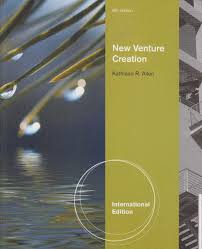Test Bank For New Venture Creation International Edition 6th Edition by Kathleen R. Allen
Digital item No Waiting Time Instant Download
In Stock
Original price was: $55.00.$25.00Current price is: $25.00.
Test Bank For New Venture Creation International Edition 6th Edition by Kathleen R. Allen
Chapter 3—Creativity and Opportunity
TRUE/FALSE
1.Creativity enables entrepreneurs to differentiate their businesses from competitors so that customers will notice them.
ANS: T PTS: 1
2.Stage seven of Norman Seeff’s creative process represents the emotional fulfillment of the original dream.
ANS: T PTS: 1
3.Common types of roadblocks to creativity are personal, relational, and environmental.
ANS: F PTS: 1
4.The illumination step in Wallas’s creative process brings the idea to an outcome.
ANS: F PTS: 1
5.Discovery theory and creation theory help explain how entrepreneurial opportunities happen.
ANS: T PTS: 1
6.Entrepreneurs erect roadblocks that prevent them from being creative.
ANS: T PTS: 1
7.The environment in which a person works can either stimulate or discourage creativity.
ANS: T PTS: 1
8.The creative journey begins with maintaining a journal of one’s thoughts and ideas.
ANS: T PTS: 1
9.Entrepreneurs build businesses based on concepts that never existed before.
ANS: F PTS: 1
10.One of the most effective ways that entrepreneurs have of finding opportunity is to see a problem and seek a solution.
ANS: T PTS: 1
MULTIPLE CHOICE
1.Entrepreneurs differ from others who have ideas in that they know how to extract ____ from those ideas to creative commercial potential.
a.
value
b.
creativity
c.
innovation
d.
opportunities
e.
problems
ANS: A PTS: 1
2.____ sees opportunity arising from shifts in external factors in the market or industry, such as regulation, technological changes, and changes in customer preferences.
a.
Problem solving
b.
Innovation
c.
Creation theory
d.
Discovery theory
e.
Value creation
ANS: D PTS: 1
3.In ____, entrepreneurs create opportunities via their actions, reactions, and experiments around new products, services, and business models.
a.
invention
b.
innovation
c.
creation theory
d.
discovery theory
e.
value creation
ANS: C PTS: 1
4.Creativity is the basis for ____, which is discovering something that did not exist previously.
a.
invention
b.
innovation
c.
creation theory
d.
discovery theory
e.
value creation
ANS: A PTS: 1


Reviews
There are no reviews yet.